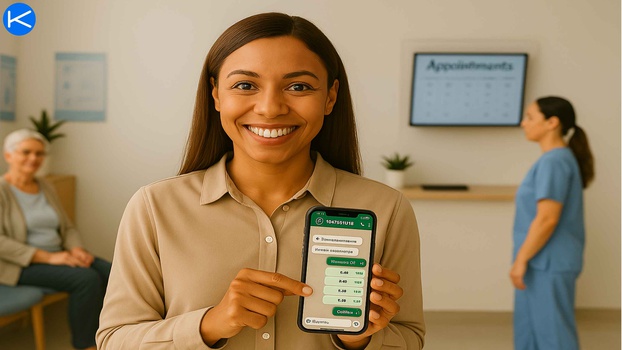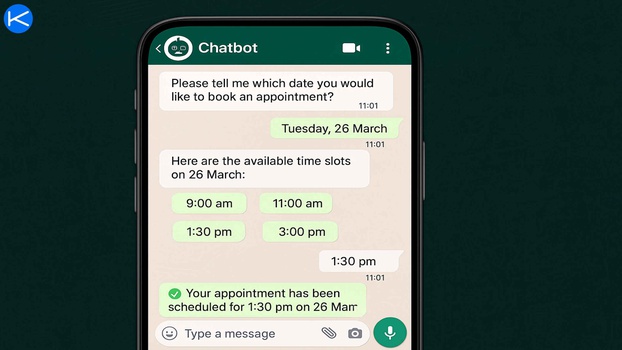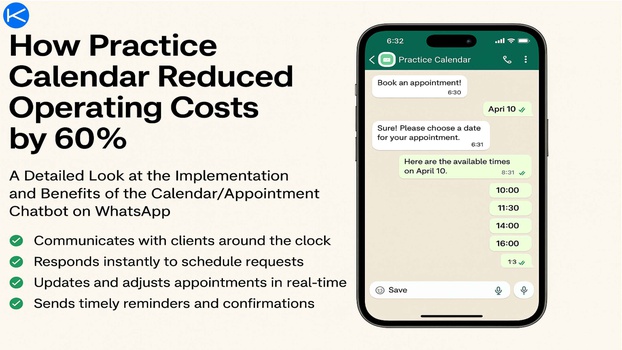Lethabo Moroka
5 months, 3 weeks
How Practice Calendar Reduced Operating Costs by 60% for Medical Practice

Businesses are increasingly looking for ways to cut costs while improving efficiency. One solution that’s gained significant traction is the use of chatbots—digital tools that can manage everything from simple customer queries to more advanced tasks like appointment scheduling. Among the standout options is Practice Calendar, a WhatsApp-integrated chatbot that has helped organizations reduce their operating costs by up to 60%.
This blog explores how Practice Calendar, built using Karabo.ai, is transforming the way professionals manage time, streamline operations, and improve client communication. We’ll walk through the implementation process step by step, highlight how it eases common scheduling challenges, and share real-world examples of the impact it’s having. Whether you’re running a clinic, consulting business, or agency, you’ll find actionable insights into how this tool can enhance your workflow and bottom line.
in this blog we will cover the following..
- Understanding the Need for a Chatbot Appointment Calendar
- How Practice Calendar on WhatsApp Works
- Key Features of the Practice Calendar Chatbot
- Step-by-Step Implementation and Configuration
- How It Reduced Operating Costs by 60%
- Case Study: Real-World Impact and Feedback
- Best Practices and Tips
- Beyond Scheduling: Additional Use Cases
- Challenges and How to Overcome Them
- Conclusion
Imagine running a busy dental practice, therapy clinic, or consulting agency—your day is filled with back-to-back appointments, constant phone calls, and last-minute rescheduling. Managing the schedule can be challenging and time-consuming, often requiring dedicated personnel or even entire departments to coordinate tasks, confirm appointments, and send reminders. Not only does this take away valuable resources that could be allocated elsewhere, but it also introduces a significant margin for human error.
Enter the Practice Calendar Chatbot. Designed to function seamlessly on WhatsApp, one of the world’s most popular messaging platforms, this chatbot replaces tedious manual processes with an automated scheduling system that:
Communicates with clients around the clock
Responds instantly to schedule requests
Updates and adjusts appointments in real-time
Sends timely reminders and confirmations
Provides reports and analytics on appointment data
Moreover, 60% cost reduction is not just a random statistic—it’s the combined result of reduced manpower, fewer no-shows (thanks to automated reminders), and the overall streamlining of scheduling operations. As businesses recover from uncertain economic climates and seek to become more agile, solutions like the Practice Calendar Chatbot prove to be game-changers.
Understanding the Need for a Chatbot Appointment Calendar

Manual scheduling systems, whether pen-and-paper-based or reliant on email or phone calls, are prone to bottlenecks and inefficiencies. Here are some of the primary issues that a chatbot-based appointment calendar addresses:
High Administrative Costs: Traditional scheduling often demands a dedicated staff member to handle phone calls, emails, or text messages. Over time, these costs escalate, especially in high-volume practices.
Missed Appointments and No-Shows: Without consistent reminders and easy cancellation or rescheduling processes, no-shows can lead to significant revenue losses.
Limited Availability: A receptionist’s working hours typically limit scheduling to the hours the business is open. Outside of these hours, potential clients must wait, possibly losing interest or seeking alternatives.
Unscalable Systems: As a business grows, manual scheduling becomes increasingly cumbersome. More appointments mean more phone calls, more data to manage, and more potential for mistakes.
A chatbot calendar, especially one that integrates into a widely used messaging platform like WhatsApp, overcomes these challenges with automation, 24/7 availability, and user-friendly interfaces.
How Practice Calendar on WhatsApp Works

The Practice Calendar Chatbot leverages WhatsApp’s enormous user base—over two billion users globally—to ensure scheduling is as simple as sending a message. Here’s a high-level overview of how it operates:
User Initiation: A client or patient sends a WhatsApp message to the business’s official WhatsApp number (or scans a QR code that opens the chat).
Automated Response: The chatbot greets the user and presents available options: Book an Appointment, Check Availability, Reschedule, etc.
Date & Time Selection: The user selects a convenient date and time from the available slots. The chatbot dynamically updates available options based on existing bookings to avoid double scheduling.
Confirmation & Reminders: Once the appointment is booked, the chatbot confirms it instantly and automatically schedules reminders—these can be set to one day before, one hour before, or however the business sees fit.
Follow-up & Rescheduling: If a user needs to cancel or change an appointment, they can do so conveniently through the same WhatsApp chat. The system immediately updates the calendar and frees up the slot for others.
All this occurs in real-time, drastically reducing the back-and-forth communication between staff and clients.
24/7 Accessibility
Clients can book appointments any time of the day, any day of the week. This round-the-clock accessibility has been linked to increased bookings because it removes the friction of having to wait for business hours.
Real-Time Calendar Sync
Every appointment is synced in real-time. Whether you use Google Calendar, Outlook, or a built-in scheduling tool, the chatbot ensures all calendars are updated the moment a booking is confirmed or modified.
Automated Reminders
Reduce no-shows by sending out strategic automated reminders. These reminders can be customized with relevant messaging, links, or instructions to ensure that clients are fully prepared.
Personalized Chat Flow
Using Karabo.ai’s platform, you can design a personalized chat flow that matches your brand’s voice. Include short FAQ sections, share relevant information about your business, or even collect necessary intake details before the client arrives.
Analytics Dashboard
Monitoring performance is essential. The Practice Calendar Chatbot includes analytics features that can highlight trends such as peak booking times, high cancellation rates, and more—enabling data-driven decision-making.
Step-by-Step Implementation and Configuration

Visual Appointment Calendar
Karabo.ai provides a calendar interface where businesses can input and manage available appointment times. This helps power chatbot features like appointment scheduling.
Integration with Google Calendar
The “Sign in with Google” button in the top right indicates that Karabo.ai allows Google Calendar synchronization. This means:
Your appointments scheduled via chatbot can sync directly with your Google Calendar.
Events added to Google Calendar can reflect here.
Double-booking is prevented by checking your existing schedule in real time.
Edit Calendar Information Button
The “Edit Calendar Information” button allows users to:
Set working hours (e.g., 9 AM to 4 PM).
Choose appointment durations (15, 30, 60 mins).
Decide if weekends are available.
Add appointment descriptions like “Zoom link” or “office location.”
✅ What You Can Do With This Calendar
Set Availability for Chatbot Appointments
Control when customers can book time with you.
The chatbot will only offer time slots based on this calendar.
Offer Real-Time Booking Through WhatsApp/Messenger
A customer chatting with your Karabo.ai bot can say, “I’d like to book an appointment.”
The bot checks your calendar and offers live time slot options.
The appointment is confirmed instantly and added to your synced Google Calendar.
Prevent Double Booking
Since the bot reads your calendar availability in real-time, it won’t offer booked slots to new clients.
Track & Manage Bookings
Use the visual interface to view scheduled appointments.
Edit or remove slots easily.
Handle Multiple Chatbots
On the left side, you’ll see multiple chatbots (e.g., “iamsoftware,” “Wacha History”) can be linked to different calendars.
How It Reduced Operating Costs by 60%

The bold claim of a 60% reduction in operating costs needs clear justification. Below are the key ways Practice Calendar achieves this:
Less Manual Labor
Traditionally, businesses require staff to handle appointment scheduling, rescheduling, and cancellations. By automating these tasks, companies can redeploy staff to more strategic roles or reduce headcount dedicated to scheduling.
Fewer No-Shows
Automated reminders significantly reduce missed appointments. Each missed appointment can translate into lost revenue, wasted resources, or inefficiency.
Scalable Infrastructure
Whether you’re handling 10 appointments a day or 1,000, the chatbot scales effortlessly. This means you’re not forced to increase your administrative overhead as you grow.
Enhanced Customer Loyalty
With increased convenience comes higher customer satisfaction. A satisfied client base leads to more repeat visits, referrals, and overall steadier revenue streams.
Reduced Phone and Communication Costs
Constant phone calls can be expensive, especially for international or long-distance calls. WhatsApp-based chatbots use data connections, which can be far more cost-effective.
24/7 Availability
You no longer miss out on potential appointments that come in after-hours. This extends your booking window to a full 24 hours daily, capturing more leads who might otherwise go elsewhere.
Taken together, these efficiencies drive down operational costs in a measurable, lasting way. While the exact percentage of cost reduction varies from business to business, many find that the 60% figure aligns well with their experience once the solution is fully adopted.
Case Study: Real-World Impact and Feedback
The DentCare Clinic Example
Background: DentCare Clinic is a mid-sized dental practice that manages around 150 appointments weekly. Before adopting Practice Calendar, they had a reception staff of three people who spent approximately 40% of their time on scheduling tasks.
Challenges:
Multiple daily phone calls and messages for bookings
High rate of no-shows (about 15% of total appointments)
Difficulty in maintaining a consistent communication channel with patients
Solution: DentCare Clinic integrated Karabo.ai’s Practice Calendar chatbot with their existing WhatsApp Business account. They customized the chatbot to handle different appointment types (cleaning, orthodontic check-ups, emergency visits), set up reminders 24 hours before and 2 hours before each appointment, and added short educational messages about dental hygiene.
Results:
Cost Savings: They were able to reallocate one full-time receptionist to other tasks, saving an estimated 35% in labor costs in the front office.
No-Show Reduction: The no-show rate dropped to 5%, thanks to automated reminders.
Client Satisfaction: Patients appreciated the convenience of booking via WhatsApp. DentCare saw a slight increase in new patient sign-ups, attributed partially to the easy booking process.
Best Practices and Tips

Keep Your Calendar Updated
Ensure that you, your team, or relevant staff members accurately update availability in real-time. Automated systems work best when they have accurate data—so if someone is out sick or the practice closes early, update the calendar immediately.
Use Clear, Concise Language
When customizing your chatbot dialogues, avoid jargon and keep the steps straightforward. Users should not feel overwhelmed by the process.
Set Up Multiple Reminder Intervals
Consider sending a reminder 48 hours before an appointment, then again 2-3 hours prior. This layered reminder approach significantly reduces no-shows.
Offer Additional Resources
Leverage the chatbot to share links to FAQs, pre-appointment instructions, or forms. This not only enhances user engagement but also prepares clients before they arrive.
Regularly Review Analytics
Monitor metrics like average booking lead time (how far in advance people book), cancellation rates, and peak booking hours. Use these insights to optimize staff scheduling and resource allocation.

Beyond Scheduling: Additional Use Cases
While the primary focus is on appointment booking, Practice Calendar offers a foundation to extend chatbot functionalities. Some potential expansions include:
Payment Processing: Integrate payment gateways so that clients can pay upfront for services, reducing last-minute cancellations.
Customer Service FAQs: The chatbot can address common queries—e.g., “What are your operating hours?” or “Do you accept insurance from XYZ provider?”
Automated Follow-Up: After a client’s appointment, the chatbot can send follow-up messages to request feedback or share instructions for post-service care.
Marketing Campaigns: Offer promotions or loyalty programs via the chatbot to maximize engagement with existing clients.
Resource Management: Integrate with inventory or staff scheduling systems if your business requires more complex resource allocation.
Challenges and How to Overcome Them
Ensuring Privacy and Security
Handling appointment data often involves sensitive personal information. Make sure your chatbot solution adheres to industry standards for data protection (e.g., HIPAA in the U.S., POPIA in South Africa, GDPR in the EU). Karabo.ai provides encryption and secure API integrations to mitigate these risks.
Handling Complex Scheduling Scenarios
Certain practices require more than just a simple appointment slot—e.g., specialized equipment booking, multi-person appointments, or multiple service stages. In such cases, you may need a more advanced setup within Karabo.ai’s platform to account for these complexities.
Adoption Resistance
Your existing staff or clients may be hesitant to adopt a new system. Overcome this by:
Providing clear training and documentation
Gradually phasing out the old system
Emphasizing benefits (less time on calls, higher appointment throughput)
Encouraging users to try the new system through small incentives or demonstrations
Potential Downtime
All tech solutions can experience occasional downtime. Reduce risks by using a reliable platform like Karabo.ai and implementing backup processes in case of connectivity issues or server outages.
Conclusion
Practice Calendar, powered by Karabo.ai, presents a transformative solution for businesses looking to simplify scheduling, enhance customer experience, and realize tangible cost savings. By leveraging WhatsApp’s global reach, the chatbot ensures 24/7 accessibility, instant responses, and efficient booking management—capabilities that translate into real operational efficiencies and a significant reduction in overhead costs.
From small practices to large-scale enterprises, the benefits are clear: automated reminders reduce no-shows, integrated calendars eliminate double bookings, and real-time analytics empower data-driven decisions. Most importantly, the solution’s impressive performance in reducing operating costs by 60% is a testament to the power of well-implemented technology in optimizing workflow and resource management.
If you’re considering a scheduling overhaul, now is the perfect time to explore what the Practice Calendar chatbot has to offer. With intuitive setup, robust customization, and the capacity to scale as your business grows, this tool is poised to redefine how businesses manage appointments in the modern digital era.

Final Thoughts
Technology should simplify life, not complicate it. In an age of rapid digital adoption, solutions like Practice Calendar deliver on that promise by eradicating mundane tasks, enhancing user experiences, and boosting the bottom line. Whether you are a small startup in healthcare or a large educational institution with dozens of campuses, a WhatsApp-based scheduling chatbot can be the key to unlocking new levels of efficiency and customer satisfaction.
Interested in Learning More?
Visit Karabo.ai to schedule a demo or begin your journey toward a more efficient and cost-effective appointment management system.


